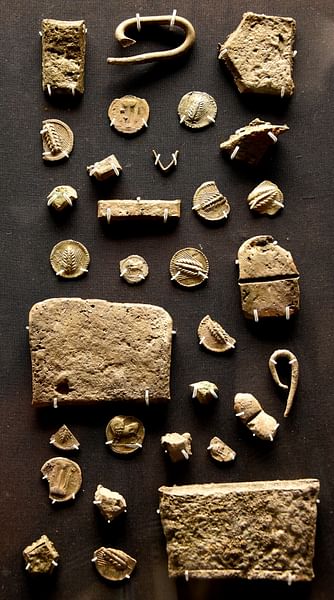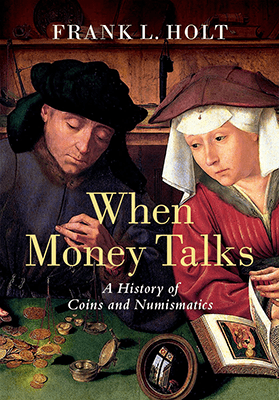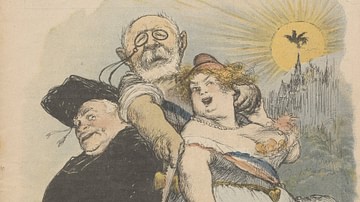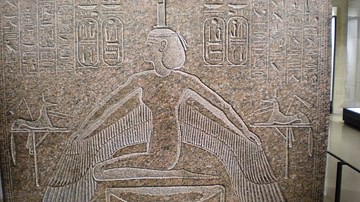Aristophanes wrote in the 5th century BCE about coin hoards in Athens. He joked about the common saying, "No one knows but the birds where I hid my money," which led buffoons in his play to follow birds around with a shovel, hoping to excavate a treasure.
Hoards in Greek Comedy
In Plautus' Aulularia (The Pot of Gold), a crass fellow buries a valuable hoard beneath his hearth. He entrusts the hoard to the household god, who relates to the audience:
He prayed that I would guard the pot of gold for him. When he died, being of such an avaricious nature, he never disclosed the hoard to his own son, preferring to leave the boy poor than to show him the coins. . . . The son was even less attentive to me, so I let him die clueless and destitute. His heir turned out to be just like the father and grandfather, but he has an only daughter who is mindful of me. Out of regard for her, I have allowed her father to find the hoard, in order that he might more readily provide her a dowry.
In another of Plautus' plays, titled Trinummus (A Day's Wage), the character Charmides also buries his coins within his house. Here Plautus reprises Philemon's New Comedy play Thesauros (The Hoard). Other comedies with the same title were produced by the Greek playwright Menander and the Roman Luscius Lanuvinus. In his play, Lanuvinus devises a neat literary trick by having the hoarder leave an explanatory note hidden with the treasure. The modern novelist Jack Whyte does the same thing in The Skystone, his popular historical fiction about Roman Britain. The note informs the new owner about earlier iterations of the hoard, such as where it had first been found and for whom it was next intended.
Ethical & Legal Considerations
Hoards and hoarders are to be found outside comedy as well. They appear in the New Testament as parables. In one instance, a servant is chastised for burying his master's money in the ground instead of investing it. The Greek writer Xenophon commented centuries earlier about this unprofitable impulse to hoard: "When a man accumulates a huge amount of silver, he takes as much pleasure in burying the surplus as in using it."
In another parable, Jesus seems to commend a person who finds a hoard in a field, conceals his discovery, then sells all his possessions in order to buy the property. Is this shrewd business or unethical behavior? According to Roman law, for instance, anyone discovering a hoard on his own property was entitled to keep it; if found on someone else's land, the treasure had to be shared evenly with the property owner. The man in Jesus' parable would be cheating the owner of his portion by hiding the discovery, yet he is apparently entitled to prosper.
The Greek writer Philostratus tells the story of a bankrupt businessman who prays to Mother Earth, keeper of hoards, to guide him to a treasure – the ancient equivalent of winning the lottery. A miracle worker offers to help, negotiating on the man's behalf the purchase of some land from a wicked owner. The businessman then finds on his new property a huge hoard and, wealthy again, sings the praises of the sage who guided him to the purchase. The suggestion here seems to be that the middleman divined the hoard's existence all along, but that it was ethical to cheat the seller because the bankrupt businessman was more deserving of the gold. Elsewhere, Philostratus describes a lawsuit in which a person buys land that later, when plowed, reveals a buried hoard. The seller of the field sues for the treasure since he would never have sold the land if he had known of the windfall. The buyer in this case practiced no duplicity and was awarded the judgment. Clearly, hoard discoveries gave rise to many legal disputes and moral quandaries.
Criminal Cases
Some cases were blatantly criminal. The Roman orator Cicero reports a circumstance of murder and robbery surrounding a savings hoard:
The renowned physician Strato committed murder to conceal a theft in his own house where the family kept a chest full of coins and gold. One night he murdered two slaves while they were asleep and hid their bodies in a fish pond. Then he cut out the bottom of the chest and took away the coins and five pounds of gold.
The Greek orator Lysias describes a trial centuries earlier occasioned by murder and the robbery of a money-chest stuffed with silverware and hundreds of Greek and Persian coins. Egyptian papyri preserve police records concerning stolen coin hoards of the Graeco-Roman period. For example, in 28 CE a villager named Orsenouphis filed a report with the local police chief, complaining that a worker renovating his house had found and stolen an old hoard hidden in the walls. Orsenouphis claims to know the contents of the pilfered box down to the exact weight of each item of jewelry in it, alongside 60 silver drachmas, even though the hoard had been hidden 42 years earlier by his mother when the complainant was only eight years old. In another case dated 140 years earlier, some Greek cavalrymen broke into the room of a complainant's mother and carried off a jar containing a hoard of 1,600 copper drachmas.
Hoards in Warfare
Hoards feature prominently in accounts of ancient warfare. Plutarch records a few instances involving famous generals such as Alexander at Thebes and Pompey at Carthage. Appian tells a tale about Cassius at Rhodes:
He ordered private citizens owning any money to bring it to him, proclaiming death to those who tried to conceal it, together with a reward of one-tenth for free informers or emancipation for slaves. At first, many Rhodians hid what they had, hoping that in the end the threat would not be carried out, but when they saw the rewards paid and those who had been informed against killed, they became alarmed. . . . Some of them dug their money out of the ground, others drew it out of wells, and others brought it from tombs and surrendered it to Cassius.
Athenaeus describes how a group of Phoenicians, forced to abandon their city after a siege, buried all their money in secretly marked hiding places in case they could ever come back. According to Josephus, the practice of smuggling hoards out of a besieged city by swallowing them had a horrendous outcome when 2,000 Jewish refugees were disemboweled by their greedy captors searching for the coins.
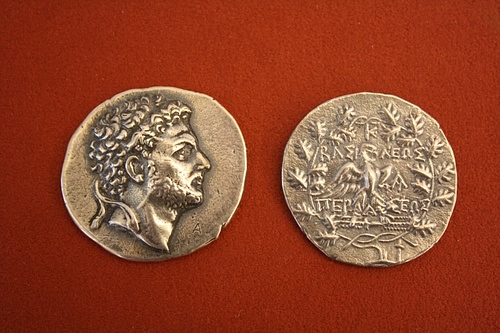
When defeated by Rome, King Perseus of Macedonia allegedly left his heirs a treasure map marking the locations of two hoards, one under a road at Amphipolis containing 900,000 drachmas and another at Thessalonike with 420,000 drachmas. Cassius Dio informs us of another royal hoard allegedly hidden from the invading Romans in about 100 CE:
The treasures of Decebalus were discovered hidden beneath the river Sargetia. Decebalus had forced some captives to divert the course of the river, which ran past his palace, in order to bury the hoard in its bed. Stones were piled over the treasure and the river redirected back into its original channel.
Divers were able to recover the Decebalus treasure, a dangerous profession extending back as far as the 5th century BCE when the Greek salvagers Scyllias and his daughter Hydna attained fame. Accidents aside, sometimes salvage divers were killed to keep them quiet after successfully rescuing hoards. To assist in potential salvage operations, some individuals took clever precautions. In 56 BCE, Cato Uticensis amassed nearly 199 tons of plundered silver that he wanted shipped to Rome. In case of misfortune, he prudently divided the treasure into separate chests and attached to each one a long rope with a huge cork at the end so that the money could be located if the ship went down.
